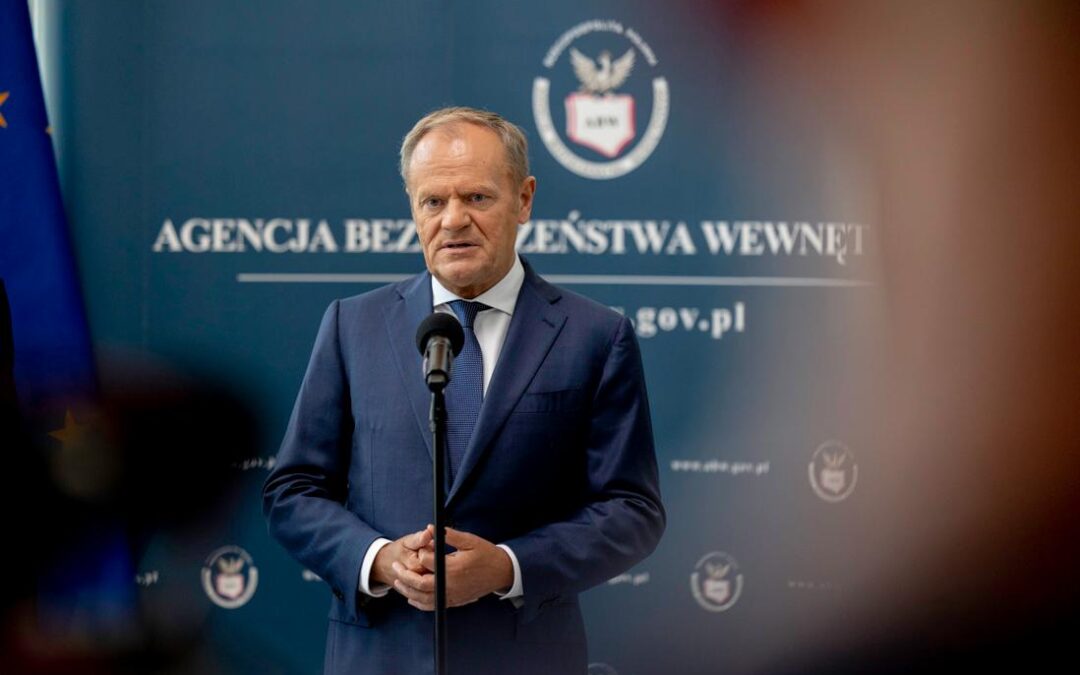Keep our news free from ads and paywalls by making a donation to support our work!

Notes from Poland is run by a small editorial team and is published by an independent, non-profit foundation that is funded through donations from our readers. We cannot do what we do without your support.
Poland’s security services have detained eight further people suspected of planning acts of sabotage on behalf of Russia, Prime Minister Donald Tusk has announced.
One of those detained – and now also charged – is a Ukrainian citizen who is accused of sending packages containing explosives to Ukraine, with the intention of detonating them during transport.
Sprawy, o których pisze premier @donaldtusk dotyczą prowadzenia rozpoznania obiektów wojskowych i elementów infrastruktury krytycznej, przygotowania środków do przeprowadzenia aktów dywersji i bezpośredniej realizacji ataków. ABW ściśle współpracuje z SKW, Policją i Prokuraturą. https://t.co/mZmZERqVpS
— Tomasz Siemoniak (@TomaszSiemoniak) October 21, 2025
“The ABW [Internal Security Agency], in cooperation with other services, detained eight people in various parts of the country in recent days, suspected of preparing acts of sabotage,” wrote Tusk on Tuesday morning on social media.
His post was shared by security services minister Tomasz Siemoniak, who added that the accusations against those detained “concern reconnaissance of military facilities and critical infrastructure elements, preparation of means to carry out acts of sabotage, and direct execution of attacks”.
At a subsequent press conference, the spokesman for Siemoniak’s department, Jacek Dobrzyński, confirmed the recent detention of eight people. He also revealed that, in recent months, the ABW “has detained a total of 55 individuals who acted to the detriment of Poland on behalf of Russian intelligence”.
One of those recently detained is a Ukrainian citizen living in Poland who can be named only as Danylo H. under Polish privacy law. Last week, he was charged by prosecutors in Warsaw with preparing acts of sabotage of a terrorist nature and working on behalf of foreign intelligence.
The National Prosecutor’s Office said that he had been charged as part of an investigation into a group of “identified individuals, acting on behalf of the Russian intelligence services, [who] were preparing acts of sabotage involving the sending of shipments containing explosives and incendiary materials to Ukraine”.
“These shipments were intended to spontaneously combust or explode during transport,” they added. “The purpose of these planned actions was to intimidate the population and destabilise European Union member states supporting Ukraine.”
However, the packages were intercepted by the Romanian authorities before they exploded. Two other suspects, also Ukrainians, were detained in Romania as part of the same case. The Romanian Intelligence Service (RSI) in a statement of its own, also confirmed the detentions and the suspected explosives plot.
Prokurator Mazowieckiego Pionu PZ PK przedstawił obywatelowi Ukrainy zarzut udziału w działalności obcego wywiadu i przygotowywania aktów sabotażu o charakterze terrorystycznym. ⬇️https://t.co/1flhO33Tpe
— Prokuratura (@PK_GOV_PL) October 21, 2025
Dobrzyński also revealed that two individuals – who he did not identify in any way – were recently detained by the ABW in the town of Biała Podlaska, eastern Poland, on suspicion of surveilling military infrastructure, reports news website Infosecurity24.
Two more were detained in the city of Katowice, southern Poland, also for suspected surveillance of military infrastructure. Another was detained in the northern Pomerania province for suspected arson.
Recent years have seen a series of cases in which operatives working on behalf of Russia – often Ukrainian or Belarusian immigrants hired and issued orders through online messaging service Telegram – have been accused of carrying out sabotage, espionage and disinformation.
The cases are part of what Polish officials describe as Russia’s “hybrid warfare” campaign, a mix of sabotage, cyberattacks, disinformation and other covert operations intended to weaken Poland’s security and sow social unrest.
In May, Poland closed Russia’s consulate in Kraków after concluding that Moscow was behind a fire that destroyed Warsaw’s largest shopping centre, Marywilska 44, in 2024. The Russian consulate in Poznań was closed for similar reasons last year.
Poland has announced the closure of Russia's consulate in Kraków in response to evidence Moscow was behind the fire that destroyed Warsaw's largest shopping centre.
It is the second Russian consulate closed as retaliation for Moscow's sabotage campaign https://t.co/p77JEhNn7u
— Notes from Poland 🇵🇱 (@notesfrompoland) May 12, 2025

Notes from Poland is run by a small editorial team and published by an independent, non-profit foundation that is funded through donations from our readers. We cannot do what we do without your support.
Main image credit: Służby specjalne (under CC BY-NC-ND 3.0 PL)

Alicja Ptak is deputy editor-in-chief of Notes from Poland and a multimedia journalist. She has written for Clean Energy Wire and The Times, and she hosts her own podcast, The Warsaw Wire, on Poland’s economy and energy sector. She previously worked for Reuters.




















